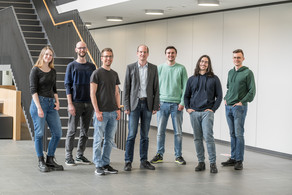Writing a Thesis at Our Group
Please do not hesitate to contact any member of our group if you are interested at writing a thesis at our group.
Requirement:
- You should have successfully taken one of our classes (lecture/seminar) when you want to write a thesis with us.
Completed Theses
2023-Present at Technical University of Dortmund
Bachelor Theses:
- Phase Retrieval With Denoising Diffusion Probabilistic Models
- Solving Inverse Problems using Score-based Diffusion Models
- An Empirical Analysis of Self-built GPT Models for GLUE Task Performance
- AlphaZero Approach for Dice Games with Various Levels of Complexity
- Classification of microanatomical structures of the mouse liver by machine learning from intravital multiphoton microscopy videos
- UEFA EURO 2024 prediction
- Wavelet-based Clustering of DAS Data
- Probabilistically Modelling Self-Supervised Learning
- Speech Enhancement and Audio Deconvolution with Deep Learning
- Prioritizing Samples in DQN: The Evolution from Random to Reducible Loss
- Recurrent Graph Neural Networks for SAT Problem Solving
- Zero-Shot Denoising of Distributed Acoustic Sensing Data using Deep Priors
Master Theses:
- Data Augmentation Methoden für Deep Learning
- Deep Reinforcement Learning for SAT Solver Heuristics
- Deep Learning-Based Cellular Feature Analysis in Digitized Tissue Samples
- Learning To Explore: A Comprehensive Study And Implementation Of Exploration-Based Reinforcement Learning
- Distributional Reinforcement Learning with Score Functions
- Seismic Arrival-time Picking on DAS Data with Deep Learning
2015-2022 at University of Düsseldorf
Bachelor Theses:
- Active pre-training with phasic policy gradient
- Classification models for argument recommender systems
- Phase retrieval with attention
- Deep learning of financial market dynamics
- Multi-stage progressive image dehazing
- Contrastive self-supervised pretraining of vison transformers
- Erweiterung und Evaluation der Neural Power Unit
- Pay attention to what you calculate: transformer-based approach on recognition of handwritten mathematical expressions
- Ein nicht-operatorbasierter Ansatz für das Conditional Kernel Mean Embedding
- Using unrolled networks for reference based Fourier phase retrieval
- Echtzeiterkennung mit YOLO
- Dynamically modifying ML programs for automated machine learning
- Learning by self-play in turn-based environments
- Natural gradient boosting for classification
- Deep cascading Fourier phase retrieval
- Post-hoc model interpretability vs. intrinsic model interpretability
- Implementing and benchmarking various classes of normalizing flows
- Graph-based semi-supervised leraning with GPs
- Graph-based semi-supervised learning: the distribution of labels
- Learning to write to learn to read
- MRI contrast mapping using machine learning
- Lottery ticket hypothesis - seeking capable subnetworks
- Integrating the Game CATAN into the RL Framework OpenSpiel
- Machine Learning auf Sätzen und ihren semantischen Frames
- Konsistente Kernel Erwartungswert-Schätzung für Funktionen von Zufallsvariablen
- Implementing Continuous High-Resolution Image Reconstruction using Patch Priors
- Adversarial attacks on capsule networks
- Implementing survey propagation
- Optimization of submodular functions
- Nicht-lineare ICA mit neuronalen Netzen
- Chatbots with deep learning
- Implementing AlphaZero for small board games
- Playing Go with Recurrent Neural Networks
- Actor-critic reinforcement learning with experience replay
- Proximal policy optimization (PPO)
- Reimplementing and extending Tesauro's TD-Gammon
- A ML approach to detect and classify spores in microscopy images
- Actor-Critic Reinforcement Learning
- Analyzing Brain Images with Deep Learning
- Deep Q-Learning in TensorFlow
- Grade prediction with machine learning
- Implementation of variational autoencoder
- Classification of data from the ATLAS experiments
- Collaborative filtering
- Causal relations for two random variable
- Representing distributions as mixture of Gaussians
- Finding stars in traces
Master Theses:
- Why don't we have robust classifiers?
- Could Brothers Grimm Create a Dictionary with BERT?
- Topic-aware approaches to Natural Language Processing
- Latent optimization for deep generative phase retrieval
- Cyclophobic reinforcement learning
- Erweiterung von fortschrittlichen Reinforcement Learning Algorithmen
- Classical and integer linear programming approaches to learning causal structure
- Towards better understanding stochastic gradient descent for deep learning
- World models for reinforcement learning
- Measuring the similarity of arguments with BERT
- Scaling deep reinforcement learning
- Deep learning methods for phase retrieval
- Alpha matting revisited
- Capsules for generative adversarial networks
- Bayesian methods for deep learning
- MCMC for Bayesian computation in causal inference
- Multiframe blind deconvolution with lots of noise
- Probabilistic programming in Julia



